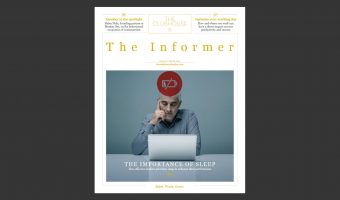News from in & around
The Clubhouse
Sleep Secrets of Resilient 21st-Century Leaders
The greatest factor in your performance could be the quality and quantity of your sleep, explains Rasmus Hougaard, founder of Potential Project.

It’s no secret that most of us don’t get enough sleep and suffer for it. If you’re between the ages of 16 and 64, and don’t get seven to nine hours of sleep per night, your logical reasoning, executive function, attention, and mood can be impaired. Worse, severe sleep deprivation can lead to depression, anxiety, and symptoms of paranoia. In the long run, sleep deprivation is a contributor to the risk of dementia and Alzheimer’s.
Surprisingly, one group that doesn’t need to heed these warnings is executives. In our assessment of 35,000 leaders and interviews with 250 more, we found that the more senior a person’s role is, the more sleep they get. There are two possible explanations for this. Either senior executives, with the help of assistants and hard-working middle managers, do less and take more time for sleep, or senior executives have had the wisdom and discipline throughout their career to get enough sleep and thereby maintain a high performance level without burning out.
Our conclusion is that the latter is the case. But in contrast, our data found that 68% of non-executive leaders get five to seven hours of sleep per night. When there are not enough hours in the day, they steal some from the night. Many leaders stay up late to catch up on email or other tasks. According to our research, this tendency is widespread, regardless of gender. This is a problem. For leaders, sleep is not a luxury. Research has found that there is a direct link between getting enough sleep and leading effectively and that sleep-deprived leaders are less inspiring.
The key message: If you want to be an effective leader, and rise in the ranks, get enough sleep. Of course, it’s one thing to make a commitment to go to bed early, and another to actually get seven or more hours of quality sleep. For many leaders, going to bed is only part of the problem. The other part is getting high-quality, restorative sleep. Fortunately, a good night’s sleep is not a random event; it’s a trainable skill.
Here are a few guidelines:
1. Catch the melatonin wave Go to bed when you’re just starting to feel drowsy (usually between 10pm and 11pm). Melatonin, a natural hormone released from the pineal gland, deep inside your brain, makes you relax, feel drowsy, and ultimately fall asleep. If you learn to notice it and go with its fl ow, you’ll enjoy falling asleep and have better-quality sleep during the night.
2. Avoid screens Turn off TVs, smartphones and laptops at least 60 minutes before bed. Why? Each of those screens emits high levels of blue light rays. That blue light suppresses your pineal gland and, in turn, the production of melatonin. It’s like your brain reads the blue light as if the sun is still up.
3. Enjoy only perceptual activities 60 minutes before bed Too much thinking is another enemy of late-evening drowsiness. Conceptual activities like intense conversations, replying to emails, working, or reading can arouse your attention and suppress your natural sleepiness. In contrast, perceptual activities like doing the dishes, going for a walk, or listening to music can help you better catch the wave of melatonin.
4. Avoid eating two hours before bed Eating activates the fl ow of blood and sugar in the body, keeping your body and mind alert and awake. Not the ideal state for a good night’s rest.
5. Practise mindfulness Mindfulness has been proven to enhance sleep quality. Do five minutes sitting on your bed before you go to sleep.
Learn how to become a more mindful and resilient leader at our next Leadership Masterclass, Resilience for 21st Century Leaders, on March 20th at The Clubhouse, Holborn Circus. Delivered by our partners Potential Project, this is a unique opportunity for leaders to discover many more highly practical and research-based strategies to build greater individual and team resilience and high levels of sustained performance
This article was originally featured in The Informer – March 2019. To read the full magazine please click here


